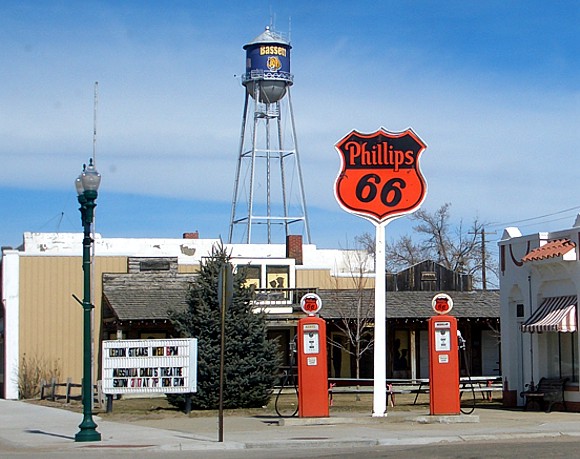Phillips 66 Co. Agrees To Retire Over 21 Billion Sulfur Credits As Part of Settlement With EPA
 April 13, 2014
April 13, 2014  Kyriaki (Sandy) Venetis
Kyriaki (Sandy) Venetis Phillips 66 Co. has agreed to retire over 21 billion in sulfur credits as part of a settlement with the U.S. Environmental Protection Agency relating to allegations that the company violated the Clean Air Act.
 Old fashioned Phillips 66 Station in Bassett, Neb. “This is a non-functional store front with replica and refurbished parts to make it look like a gas station. It has not been a gas station for 40 years. 20 years ago it was privately owned and used as a storage facility for junk of the owner. Approximately 1997 it was purchased by a Bassett tourist council and refurbished to look like it did in the 1950’s & 60’s.” Caption and photo courtesy Brian Kell, a contributor for Wikimedia Commons.
Old fashioned Phillips 66 Station in Bassett, Neb. “This is a non-functional store front with replica and refurbished parts to make it look like a gas station. It has not been a gas station for 40 years. 20 years ago it was privately owned and used as a storage facility for junk of the owner. Approximately 1997 it was purchased by a Bassett tourist council and refurbished to look like it did in the 1950’s & 60’s.” Caption and photo courtesy Brian Kell, a contributor for Wikimedia Commons.
The EPA allegations included that the company failed to comply with recordkeeping, reporting, sampling, and testing requirements at several of its owned and operated refineries and terminals across the country, including:
- the Sweeney Refinery in Old Ocean, Texas.
- the Borger Refinery in Borger, Texas
- the Alliance Refinery in Belle Chasse, La.
- the Lake Charles Refinery in Westlake, La.
- the Wood River Refinery in Roxana, Ill.
The EPA discovered these violations during facility inspections and through a review of company records, which included the results of third-party company audits required by the Clean Air Act.
Among the allegations are that the company “incorrectly” reported sulfur results for eight batches of gasoline at the Alliance Refinery, and failed to “retain the original sulfur test results for 81 batches.”
The EPA also alleged that all of the sulfur credits that Phillips 66 generated between 2006 and 2012 were invalid “because oxygenate blenders are not permitted to generate sulfur credits.”
In response, during the settlement negotiations, the company submitted a letter to the EPA stating that it had voluntarily retired an estimated 3.4 billion sulfur credits that it had generated in 2007, “in order to mitigate any potential harm associated with its alleged generation of invalid sulfur credits.”
